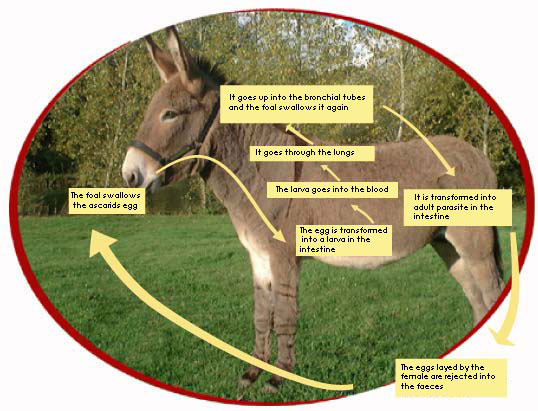|
Ascarids are large roundworm reaching over 10 inches
in length, whitish in colour which live in the small intestine of
the animals. It mainly affects foals (less than two years).
| Contamination and cycle of
life |
 |
The young donkeys are infested by swallowing the Ascarids' eggs
which are everywhere in the environment: pasture, litters... They
hatch after ingestion and their migration route includes the liver
and lung, then reach the air cells through the blood.
Then the larvae will go up to the bronchial tubes until they reach
the throat, and then will be swallowed with the expectorations and
return to the intestine where they are transformed into adults parasites.
The female adult Ascarid lays thousands of eggs each day which are
rejected into the faeces. The larvae are encapsulated within eggs
on the pasture and can survive uptill for years.
The complete cycle of life lasts for 10 to 16 weeks.

Cycle life of Parascaris equorum
| Symptoms |
 |
It depends on the state of this evolution cycle, the symptoms could
be:
- cough, pneumonia (present in the lungs)
- weakening (present in the liver)
- diarrhoea (present in the intestine)
Generally, the foal is weakened and he can lose weight, and that
results in a delay in the growth and a dull fur and stitched, apathy,
anorexia as well as tendinous and bone disorders.
| Prevention - Treatment |
 |
It is not rare to find Ascarid's adults in foals which are 2,5
months to 3 months of age because they could eat maternal droppings
and can be contaminated after the first days of their life.
For the young foals, the worming should be given at 10/12 weeks
of age, and repeated 7 weekly until 1 year old. For the adults,
the diagram of worming has interventions in spring, summer, autumn
and winter by using anthelminthic against the strongyles, bots,
ascarid and taenia.
To try to avoid a fast contamination of the foal, you should look
after the females in gestation. It is thus advised to treat them
just after the foaling, and to remove the faeces every day in the
stables.
It's important to give the worming to all donkeys in the same group
at the same time, and to any donkey who has been introduced into
the group.
|










